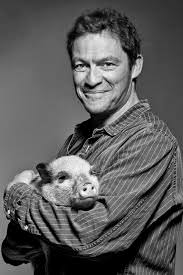Here’s Why a Former Beatle and 007 are Turning Their Noses Up at Industrial Pork Production
It’s part of a new social media campaign for the non-profit Farms Not Factories.
Here’s Why a Former Beatle and 007 are Turning Their Noses Up at Industrial Pork Production
It’s part of a new social media campaign for the non-profit Farms Not Factories.

Sixty-five celebrities from the worlds of music, acting, food, and fashion are involved in the movement aimed at exposing the problems of industrial-scale pork production in the United Kingdom. Many, along with plenty of non-famous folks, are posting selfies on social media with the hashtag #turnyournoseup. The campaign launched yesterday in conjunction with the release of a position paper from the British Society for Antimicrobial Chemotherapy that calls for a reduction in the overuse of antibiotics in human medicine and animal agriculture.
“The celebrities we asked were enthusiastic about the campaign and wanted to do whatever they could to support it,” says Tracy Worcester, Farms Not Factories’ founder and director, who is an environmental activist and former actress.


So far the public response has been positive, Worcester tells Modern Farmer in an email, since “people are increasingly concerned about factory farming and are glad to know that by their shopping choices they can help close factory pig farms while supporting high-welfare farms, where animals are kept humanely and, as a result, are healthy and rarely, if ever, require antibiotics.”
The rise in antibiotic-resistant bacteria has been blamed, in part, on the drugs’ overuse in industrial-scale animal agriculture. In some parts of the world, including the United States, antibiotics are often used a growth promoter, a preventive, and a treatment. The European Union has banned the use of antibacterials for growth promotion. According to Worcester, though, there is still the overuse of antibiotics in Britain’s industrial-scale pig farming “to compensate for overcrowding and poor welfare.”
Antibiotics aside, the campaign’s also concerned about the inhumane treatment of pigs at massive indoor pork operations – which account for about 60 percent of UK production – such as a lack of straw, which pigs use for rooting, and tail-docking, the laws against which are “widely ignored,” Worcester says. Additionally, the UK imports more than 50 percent of its pork, mostly from other EU countries where sow stalls – small metal cages that restrict the animals’ movements – are still allowed.
Swooping in to defend themselves, Britain’s National Pig Association (NPA) and AHDB Pork says that the, “UK has some of the most stringent animal health and welfare legislation in the world and UK farmers regularly work above and beyond the necessary standards,” according to a statement on the Farmers Guardian website. The NPA also points to its recently launched antibiotic stewardship program to show just how seriously the industry takes the situation.
Unlike organizations such as People for the Ethical Treatment of Animals (PETA), which is anti-animal agriculture and promotes a vegan diet, Farms Not Factories is focused on supporting smaller pork producers with high stewardship standards.
“We work to preserve and support the heritage of high welfare pig husbandry in the UK on farms where the animals are healthy, content, and able to express natural behaviors such as rooting, nesting, wallowing, walking, and playing,” says Worcester.
Whether the famous faces, such as actor Jeremy Irons and Dominic West, taking part in the campaign will have an impact on the pork industry remains to be seen, but the reason organizations flock to celebrities is because it tends to work.
Follow us

This work is licensed under a Creative Commons Attribution-NoDerivatives 4.0 International License.
Want to republish a Modern Farmer story?
We are happy for Modern Farmer stories to be shared, and encourage you to republish our articles for your audience. When doing so, we ask that you follow these guidelines:
Please credit us and our writers
For the author byline, please use “Author Name, Modern Farmer.” At the top of our stories, if on the web, please include this text and link: “This story was originally published by Modern Farmer.”
Please make sure to include a link back to either our home page or the article URL.
At the bottom of the story, please include the following text:
“Modern Farmer is a nonprofit initiative dedicated to raising awareness and catalyzing action at the intersection of food, agriculture, and society. Read more at <link>Modern Farmer</link>.”
Use our widget
We’d like to be able to track our stories, so we ask that if you republish our content, you do so using our widget (located on the left hand side of the article). The HTML code has a built-in tracker that tells us the data and domain where the story was published, as well as view counts.
Check the image requirements
It’s your responsibility to confirm you're licensed to republish images in our articles. Some images, such as those from commercial providers, don't allow their images to be republished without permission or payment. Copyright terms are generally listed in the image caption and attribution. You are welcome to omit our images or substitute with your own. Charts and interactive graphics follow the same rules.
Don’t change too much. Or, ask us first.
Articles must be republished in their entirety. It’s okay to change references to time (“today” to “yesterday”) or location (“Iowa City, IA” to “here”). But please keep everything else the same.
If you feel strongly that a more material edit needs to be made, get in touch with us at [email protected]. We’re happy to discuss it with the original author, but we must have prior approval for changes before publication.
Special cases
Extracts. You may run the first few lines or paragraphs of the article and then say: “Read the full article at Modern Farmer” with a link back to the original article.
Quotes. You may quote authors provided you include a link back to the article URL.
Translations. These require writer approval. To inquire about translation of a Modern Farmer article, contact us at [email protected]
Signed consent / copyright release forms. These are not required, provided you are following these guidelines.
Print. Articles can be republished in print under these same rules, with the exception that you do not need to include the links.
Tag us
When sharing the story on social media, please tag us using the following: - Twitter (@ModFarm) - Facebook (@ModernFarmerMedia) - Instagram (@modfarm)
Use our content respectfully
Modern Farmer is a nonprofit and as such we share our content for free and in good faith in order to reach new audiences. Respectfully,
No selling ads against our stories. It’s okay to put our stories on pages with ads.
Don’t republish our material wholesale, or automatically; you need to select stories to be republished individually.
You have no rights to sell, license, syndicate, or otherwise represent yourself as the authorized owner of our material to any third parties. This means that you cannot actively publish or submit our work for syndication to third party platforms or apps like Apple News or Google News. We understand that publishers cannot fully control when certain third parties automatically summarize or crawl content from publishers’ own sites.
Keep in touch
We want to hear from you if you love Modern Farmer content, have a collaboration idea, or anything else to share. As a nonprofit outlet, we work in service of our community and are always open to comments, feedback, and ideas. Contact us at [email protected].by Andrew Amelinckx, Modern Farmer
May 13, 2016
Modern Farmer Weekly
Solutions Hub
Innovations, ideas and inspiration. Actionable solutions for a resilient food system.
ExploreExplore other topics
Share With Us
We want to hear from Modern Farmer readers who have thoughtful commentary, actionable solutions, or helpful ideas to share.
SubmitNecessary cookies are absolutely essential for the website to function properly. This category only includes cookies that ensures basic functionalities and security features of the website. These cookies do not store any personal information.
Any cookies that may not be particularly necessary for the website to function and are used specifically to collect user personal data via analytics, ads, other embedded contents are termed as non-necessary cookies.